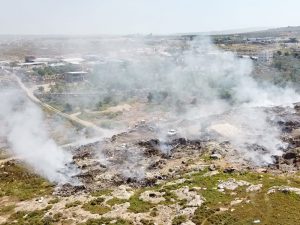Climate Action


Home » Climate Action » SDG 13 – What’s New Under the Climate Action Sun?
SDG 13 – What’s New Under the Climate Action Sun?
It’s that time again: the UN Secretary General reiterated his warning about the worsening climate crisis to the annual General Assembly in New York, a promo for the 28th Climate Change Conference (COP28) set to open in Dubai in late November.
What we’d all like to see, of course, is action – not just speeches and costly exhibitions; certainly not private jets flying in and mountains of non-degradable refuse left behind (like in COP27). Let’s hope these old habits are dying.
Which brings us to Israel, which of course is also gearing up for COP28. We’ve been closely following climate action developments in the country; as far as we can tell, the situation continues to be a mixed bag.
On the one hand: the Ministerial Committee on Legislation finally passed the Climate Bill, which stipulates for net-zero emissions by 2050 (official passage of the bill still needs to get through the Knesset, Israel’s parliament, which will emerge from its summer recess in mid-October). As in the previous Government, adoption by the Ministerial Committee was reportedly delayed because of differences among the Environmental Protection, Energy and Finance ministries.


Continuing with some good news: Israel and the United States just signed a five-year memorandum of understanding intended to strengthen bilateral climate action cooperation. In another positive development, the Energy Ministry recently secured an agreement according to which 2,000 MW of energy from renewable sources will be added to the national grid (the Energy Ministry has also been running a cute Hebrew-language video ad entitled “Something’s New Under the Sun”, encouraging Israelis to install solar panels on their homes).
But then – there’s the other hand: A tough OECD report made clear just how far Israel still has to go, from updating regulations to increasing household participation.
Soon after the OECD publication, the Environmental Protection Ministry issued its own study confirming that emissions in Israel actually increased in 2022 (under the previous Government).
If the situation wasn’t so urgent, we’d say all of this is cause for pause. Still: there’s been a lot of talk in the past year or so that “Israel enjoys a promising position as a key player in the development of revolutionary climate-tech solutions,” as emphasized in the 2023 annual report of the Israel Innovation Authority. The problem with that can be found on the very same page of the report: “As a small country, Israel does not significantly influence the climate crisis as far as greenhouse gas emissions or its ability to eliminate the global crisis are concerned.”
No, friends – every country can influence the climate crisis, for better (if it fulfills its commitments) or for worse (if it doesn’t). True, Israel isn’t the US or China. Nevertheless, it’s definitely time for the country to be all in.
Related articles


SDG 13 – Climate Action Hanging by a Thread
Climate Action It’s been about a month now since COP27 in Sharm ended with a “loss and damage fund” agreement and a vague outcome regarding decarbonization obligations;


SDG 13 -Israel at Glasgow Climate Talks
Climate Action The entire world appears to be focused these days on COP26, the UN Climate Change Conference 2021 taking place in Glasgow between October


SDG 13 – Climate Action Crossroads
Climate Action Particularly when it comes to the climate crisis, nothing – besides action itself – is more important than honest self-criticism by official bodies


















